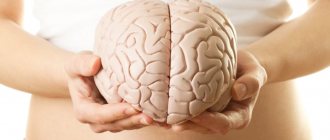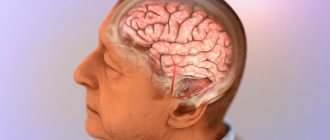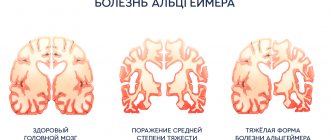Attention!
The information in the article is for reference only and cannot be used for self-diagnosis or self-medication. To decipher the test results, contact a specialist.
Previously, this condition was considered normal age-related changes that accompany the aging of the body. Now they are trying to identify it in patients as early as possible in order to slow down the process of neuron degradation with the help of drugs.
Alzheimer's disease - what is it?
Alzheimer's disease is a progressive form of senile dementia that leads to the loss of cognitive abilities. It belongs to the group of acquired neurodegenerative pathologies. The disease occurs more often in patients over 65 years of age. Forms that begin before 60 years of age are less commonly noted. The disease develops gradually and unnoticed.
The patient first develops short-term memory and attention disorders. Then the symptoms increase steadily. A person's attention, memory, and speech are severely impaired. The patient cannot develop new skills and reproduce old ones. His psychomotor coordination is impaired and his time orientation suffers.
The patient is disoriented in space, place and self. Identifies thought disorder. All pathological processes are caused by the destruction of brain cells. There are two types of Alzheimer's disease. The first is an early onset of the disease with the onset of clinical manifestations after 65 years, the second type with the onset of symptoms before 65 years.
The diagnosis is made based on the clinical picture after excluding diseases with a similar clinical picture. The diagnosis is confirmed posthumously during an autopsy. The number of neurofibrillary tangles and senile plaques is determined.
Alzheimer's disease: treatment in a private psychiatric hospital
Help for patients with atrophic brain disease can be provided in a 24-hour hospital, day ward, clinic consultations and home care.
Alzheimer's treatment in Moscow in a hospital setting is recommended for the following categories of people:
- Patients with a newly diagnosed diagnosis and severe behavioral disorders. Hospitalization will allow you to complete the examination and select therapy for aggression and refusal to take medications.
- Patients who are already receiving medications, but have difficulties with tolerating therapy or a combination of different groups of drugs. In this case, experienced doctors will adjust the prescriptions.
- Patients of any stage of the disease with delusions, hallucinations, aggressive or self-aggressive behavior. The purpose of such hospitalization is to quickly stop the exacerbation and select medications for further use.
- Patients with severe dementia requiring only nursing care and medication. Such hospitalization is necessary in case of departure, illness or other family circumstances in which the caregiver will temporarily not perform his duties.
When choosing a clinic, relatives of a patient with asthma should know that only specialists with specialized education can provide quality care. Hospitalization of patients with dementia in nursing departments and public clinics formally saves money, but has its drawbacks:
- placement of patients 4-8 people in a ward;
- limited list of medications;
- insufficient number of personnel;
- lack of a permanent psychiatrist or psychologist on staff;
- lengthy paperwork.
- queue for places in the hospital.
These features of placement and treatment of Alzheimer's in a non-core or government institution worsen the health status of such patients. Thus, overcrowding of patients has a depressing effect, and the risk of hospital-acquired infections increases. The small number of places where complex patients can be admitted limits the possibility of comfortable single or double occupancy, and independent choice of doctor and room.
The lack of necessary medications leads to the fact that the patient’s relatives have to purchase them at a separate cost or be content with what is available. An insufficient number of staff is the reason that patients receive worse care and stay in bed. The likelihood of life-threatening somatic diseases increases. In the absence of a permanent doctor, visiting staff may miss the development of complications or side effects in a weakened patient.
Knowing and taking into account the specifics of the disease, relatives have the opportunity to choose and choose the optimal option for inpatient treatment. You can get information about the conditions for placing patients, the cost and procedure for hospitalization by calling the clinic at any time. Consultations are anonymous and non-binding.
Stages
The course of the disease is divided into four phases, with a progressive clinical picture with cognitive and functional impairment. The following stages are distinguished:
- Predementia. The first manifestations of Alzheimer's disease are often similar to a reaction to stress or normal age-related changes. Changes in cognitive function are detected eight years before the advanced stage during neurocognitive testing. Problems begin with the inability to assimilate new information. Patients cannot concentrate. Planning suffers and cognitive flexibility is lacking. Abstract thinking is impaired, semantic memory is reduced.
- Early dementia. Progressive memory deterioration and impairment of all types of perception in Alzheimer's disease lead to confirmation of the diagnosis. Memory declines unevenly. Old memories of your life and long-learned facts are preserved. Recently learned facts are quickly forgotten. Speech disturbances appear. Defects in executive functions, motor disorders, and perception disorders occur. Vocabulary depletion occurs and speech fluency decreases. Clumsiness appears when using fine motor skills, and problems with coordination increase. The person is able to perform only simple tasks independently.
- Moderate dementia. Patients experience progressive deterioration of their condition. The possibility of independent action is reduced. Speech disorders become obvious, and the vocabulary is sharply depleted. The person misunderstands the meaning of the word. Reading and writing skills are lost. Coordination is impaired during complex sequential movements. The person cannot cope with most ordinary tasks. The patient does not recognize close relatives. Long-term memory deteriorates. Neuropsychiatric changes appear - irritability, wandering, emotional lability, spontaneous aggression.
- Severe dementia. At this stage of the disease, the patient is dependent on outside help. He uses single phrases and words when communicating. Then speech disappears completely. The reaction to emotional appeals to them remains. Sometimes episodes of aggression occur, which are replaced by apathy and exhaustion. Even the simplest actions are impossible without outside help. The patient's muscle mass decreases. He moves with difficulty, often unable to get out of bed.
Death occurs from associated causes - pressure ulcers, pneumonia and other diseases.
Vascular dementia
The proportion of Alzheimer's disease is currently decreasing, as the number of patients with disorders caused by cerebrovascular diseases is increasing. The determining factor in vascular dementia is memory impairment, and as the disease progresses, cognitive impairment is determined by memory problems.
Vascular dementia is characterized by relative preservation of personality. In this case, the so-called “sharpening of personal properties” occurs, i.e. character traits typical for a given patient become more pronounced and vivid.
A typical symptom is “incontinence of affect” or weak-willedness – disturbances in the emotional sphere, manifested by irritability, tearfulness, and sudden mood swings that the patient cannot control.
Diagnosis of vascular dementia:
→ Relatively acute onset symptoms of dementia;
→ Increase in cognitive impairment according to a “step-by-step” type – after certain “vascular accidents” (cerebrovascular accidents, strokes);
→ Possibility of fluctuations in the severity of symptoms. Since cerebral circulation is a fickle thing, such patients either “improve” a little or then sharply decompensate. In parallel with this, their cognitive capabilities change.
In addition to cognitive problems, vascular dementia is often accompanied by productive (delusional and hallucinatory) symptoms, psychotic manifestations, disorders of the motor system, sensory organs, etc.
Statistical studies show that with increasing age, the risk of vascular dementia steadily decreases, and the risk of Alzheimer's disease, on the contrary, increases.
Causes
A single factor responsible for the occurrence of Alzheimer's disease has not been identified. It is believed that there is a hereditary predisposition to the disease. Several hypotheses for the formation of changes in the brain are now being put forward:
- Cholinergic. Cognitive deficits are associated with decreased production of the neurotransmitter acetylcholine. The theory is considered outdated, but it is not completely abandoned.
- Amyloid. The main factor in the development of changes in the brain in Alzheimer's disease is considered to be the deposition of beta-amyloid protein in its tissues. A mitochondrial DNA defect is found in half of the patients. The gene encoding its formation is located on chromosome 21. The early onset of the disease is associated with defects in the PSEN1, APP, and PSEN2 genes. Beta-amyloid plaques appear in the brain, slowing down the speed of cognitive reactions. This hypothesis is recognized as the main one. Amyloid accumulation sets off a chain of neurodegenerative disorders.
- Tau hypothesis. It is believed that a cascade of pathological changes initiates a deviation in the structure of the tau protein. In it, hyperphosphorylated threads are connected. Neurofibrillary tangles are formed in neurons. Then the disintegration of microtubules occurs. The transport system in cells is destroyed. This disrupts the signal transmission system between neurons.
- Infectious. It is believed that the development of the disease is associated with the causative agent of periodontitis. Colonization of brain tissue by bacteria occurs, which increases the production of beta-amyloid.
Researchers note that high sugar consumption accelerates the development of cognitive impairment. This worsens the course of the disease.
Disease Information
Alzheimer's disease gets its name from the German psychiatrist who first described its symptoms in 1901. Moreover, the first mentions of the loss of reason were found in ancient treatises. Currently, there are three theories of the development of the disease:
- cholinergic: degeneration is associated with a decrease in the synthesis of acetylcholine, which is responsible for the transmission of nerve impulses;
- amyloid: disruption of the nervous system occurs against the background of deposition of pathological amyloid protein;
- tau hypothesis: the development of the disease is provoked by a change in the structure of the tau protein, which is responsible for the proper functioning of neurons.
To date, the most likely theory for the development of Alzheimer's disease is amyloid, but research is ongoing.
Make an appointment
Symptoms
The initial signs of change are almost noticeable. Manifestations of the disease develop gradually and slowly, they are as follows:
- the patient has difficulty remembering recent events;
- there are emotional disorders;
- poor recognition of famous objects;
- higher cortical functions are disrupted;
- decreased ability to navigate in space;
- depression;
- indifference;
- anxiety.
Subsequently, the patient's cognitive impairment increases. He is incapable of making decisions. Mathematical operations are difficult to complete, making it difficult to count money. Speech becomes incoherent. Long pauses appear, which are associated with a long selection of words. The late stage of the disease is characterized by the following clinical picture:
- rave;
- failure to recognize loved ones;
- hallucinations;
- convulsions;
- shuffling gait;
- loss of ability to move independently;
- personality degradation;
- disturbance of orientation in place and time;
- lack of opportunities for mental activity.
In severe dementia, the patient is completely dependent on others. He can't serve himself. Acquired skills disappear, articulate speech is lost. Aggression alternates with apathy and exhaustion.
Alzheimer's symptoms
The first sign of Alzheimer's disease may be the appearance of memory problems, in particular short-term memory; symptoms may also include:
- Problems performing tasks that were not difficult before.
- Changes in mood and character, withdrawal from family and friends.
- Impaired oral speech and writing abilities.
- Deterioration of terrain perception.
- Difficulty remembering people, difficulty recalling sequential events.
- Difficulty perceiving and interpreting images.
Diagnostics
If a disease is suspected, patients consult a psychotherapist or neurologist. The doctor examines the patient and studies his medical history. Talks with the patient and his relatives. The main criterion for diagnosis is the presence of decreased memory and cognitive abilities. Additional research methods are prescribed:
- CT and MRI of the brain;
- cerebrospinal fluid analysis for beta-amyloid protein;
- NuroPro test;
- genetic testing;
- determining the level of amyloid beta in the blood;
- positron emission tomography.
The patient is given tests to determine cognitive abilities - digital, Sage test, watch image.
Causes
The exact causes of Alzheimer's disease have not yet been clarified. It has been proven that the risk of disease increases significantly:
- with a hereditary predisposition (the disease has been proven to be associated with certain gene mutations);
- for acute and chronic disorders of the blood supply to the brain (stroke, transient ischemic attacks, atherosclerosis, arterial hypertension, etc.);
- against the background of concussions or brain contusions;
- for benign and malignant brain tumors;
- in people suffering from depression, as well as those who have suffered severe psychological trauma;
- against the background of bad habits (smoking, alcohol abuse), as well as acute or chronic intoxication;
- with low intellectual activity throughout life.
Age is one of the main predisposing factors: the older the person, the higher the risk of developing pathology. In addition, women get sick more often than men.
Treatment
To date, no treatment has been found to stop the development of Alzheimer's disease. There are medications that slow the progression of symptoms. These include the following drugs:
- NMDA antagonists;
- cholinesterase inhibitors;
- beta-secretase inhibitor.
To relieve symptoms, antipsychotics and drugs that increase cerebral circulation are prescribed. A low-calorie diet enriched with protein is prescribed. It is recommended to reduce the amount of sugar and salt. You need to eat fatty fish, foods high in B vitamins, selenium, and zinc.
Psychotherapeutic support plays an important role in improving the patient’s well-being. It is important for the patient to avoid stressful situations and stay in comfortable conditions. He needs to create a positive emotional mood.
Tips for caring for older adults with Alzheimer's disease
Content:
What is Alzheimer's disease Causes of Alzheimer's disease The main symptoms of Alzheimer's disease What can aggravate the disease? How to provide proper patient care? What to do if someone with Alzheimer's doesn't sleep well? What should you do if someone with Alzheimer's accuses you of losing their things? Hallucinations and wandering in Alzheimer's patients
What is Alzheimer's disease
Alzheimer's disease is a disease that usually occurs in old age and leads to impaired brain function.
This type of disease is otherwise called dementia. During the development of Alzheimer's, a person loses the ability to recognize family and friends. And as the disease progresses, he stops performing any activity altogether. This type of disease was first noticed by the German psychiatrist Alois Alzheimer at the beginning of the 20th century. He recorded the stages of development of an elderly woman’s disease, and after her death he published the patient’s tests. Over the next few years, 11 more similar diseases were noticed in the medical literature, in which the authors used the term “Alzheimer’s disease” during the description.
Causes of Alzheimer's disease
In most cases, this disease develops in older people, but there are cases where this type of disease also occurs in young people.
At the very beginning of the development of dementia, it is almost impossible to identify symptoms of the disease. A little forgetfulness or absent-mindedness is explained as ordinary fatigue, lack of sleep or a hard day. Over time, the patient's condition worsens, but in the early stages it is almost impossible to identify this disease.
Many may have observed a situation where people begin to look for some things that were recently in sight. Or an awkward situation when a person confuses the names of people he has known for a long time. These behaviors usually indicate the early stages of Alzheimer's disease. When caring for a person with Alzheimer's, it is necessary to notice signs of deviations in the behavior and mental state of the patient. The initial signs of the disease can be seen in the disturbance of higher cortical functions (impaired reading, counting, speech). Forgetfulness and loss of interest or skills in a favorite hobby or job can also be observed.
Main symptoms of Alzheimer's disease
To provide proper care for patients, you need to understand what symptoms Alzheimer's disease has and what stages of development are observed in a person.
First stage.
Most often, the first symptoms are confused with stress or fatigue. The earliest signs are detected several years before diagnosis using neurocognitive testing. Initial symptoms may appear when performing light household tasks. The development of the first stage of dementia is usually manifested by the following signs:
- Difficulty in choosing words in dialogue, slow speech.
- Decisions take a long time to be made.
- Memory loss, constant forgetfulness and absent-mindedness occur.
- It is difficult to comprehend large sentences and texts containing scientific information.
- Closedness, loss of interest in events happening around the patient.
- Dementia may be accompanied by hallucinations.
- Violation of abstract thinking (stereotyping, concreteness).
- Anxiety, fussiness, confusion.
Second stage.
- The ability to perform everyday activities decreases.
- Disorientation in normal (home) living conditions.
- Without the help of others, you cannot fully spend your day.
- Great forgetfulness.
- Loss of ability to self-care for personal needs.
- Neuropsychiatric manifestations such as aggression for no reason, irritability, and resistance to routine care appear.
- Vagrancy develops.
Third stage.
The third stage is the last stage in the development of Alzheimer's disease. At this stage of the disease, a person completely loses the ability to do without someone’s help and is in a state of so-called “vegetable”.
- Speech proficiency is reduced down to basic (key) phrases.
- The patient no longer recognizes anyone; every person is a stranger to him.
- Leads a recumbent lifestyle and moves very little.
- A person cannot eat food on his own.
Death occurs with the appearance of a third-party factor (bronchitis, pressure ulcer); Alzheimer's disease itself is not the cause of death.
What can aggravate the disease?
With any disease, in the course of improper treatment or care for the patient, his condition may worsen. Dementia is no exception. Therefore, when caring for a patient, the following rules must be observed:
- Do not show the patient unfamiliar places.
- Avoid walking in the dark. It is also recommended to turn on additional lighting at night.
- The patient should not be given large amounts of medications.
- Do not leave the patient alone.
- Avoid visiting crowded and noisy places.
You need to understand that caring for a patient takes a lot of time. Therefore, before taking on the responsibility of independently caring for a patient, you need to weigh all the pros and cons. When you supervise someone with Alzheimer's, you take on greater responsibility for that person's life.
How to provide proper patient care?
Unfortunately, Alzheimer's disease is incurable. And available treatment methods can only temporarily slow down the development of the disease. For example, one way to slow down the disease process is through intellectual activity, including knitting, playing backgammon or chess, and you also need to communicate as regularly as possible with a person with dementia. In order to provide proper care to the patient, you need to establish a certain daily routine. It should be relatively simple and easy to implement (for example, you don’t need to let the patient walk for a long time or often invite guests). It is also better to discuss the stages of the disease and ways to slow its progression without the patient present. Otherwise, it may cause fear, anxiety or aggression on his part.
Doctors recommend doing simple physical exercises, exercises, and light warm-ups with Alzheimer's patients.
This type of care can also slow down the progression of the disease and help maintain proper physical condition of the sick person. If the patient is unable to do any exercises or any other type of activity in everyday life, then you should not focus on this, make a comment or try to correct the patient. It can also cause anxiety, aggression or stress, which in turn affects the development of the disease and the condition of the brain. Regular communication with Alzheimer's patients.
From the moment the disease begins to develop in a person, it is necessary to understand that every day his communication abilities are deteriorating. Therefore, you need to specifically set aside a certain amount of time a day to discuss something with the patient, to tell him some of the current news. When communicating, you must adhere to the following rules:
- In a conversation, you need to behave respectfully and listen carefully to your interlocutor.
- You should try to pronounce words in one tone, calmly and legibly.
- When listening to the patient, try to show interest in his words, express understanding and listen to the interlocutor to the end.
- Avoid criticizing the patient and try to develop certain gestures during dialogue for better understanding.
- Before starting a conversation, make sure that the patient is ready to listen to you.
Creating the necessary conditions for a patient with Alzheimer's.
Over time, the disease develops and it becomes more difficult for the patient to move and perform complex actions. This increases the risk of injury or even death. In order to reduce the patient’s risk, the following recommendations must be followed:
- Try to make the floor in the house non-slippery, lay carpets, and put in less slippery surfaces.
- Install special locks on cabinets, doors and possibly windows.
- Turn off the water, disconnect dangerous household appliances (stove, microwave oven, washing machine, etc.) from the power supply while the patient is alone at home.
- Remove piercing, cutting and sharp objects from visible and easily accessible places in the house.
- Screw furniture in your home to walls or floors.
- Locks installed on the front door must be able to be opened only from the outside.
- Cover sockets with special protection.
Help with personal hygiene for Alzheimer's patients.
A person with dementia may simply forget whether they washed their hands today or brushed their teeth in the morning. Therefore, you need to ensure that the ward performs all procedures as scheduled. If, however, it turned out that you did not keep an eye on the patient and some procedure was missed, then you should not blame him for this, but you just need to help the person:
- The washing procedure should not strain the patient’s nervous system.
- Let the patient do basic procedures on his own, do not strain him with too close supervision.
- When washing, try to adhere to the habits of your ward (for example, do all the actions in the sequence that he usually follows).
Also don't forget about safety.
If it is difficult for the patient to sit down, stand up or bend over, then screw on comfortable handles in the bathroom. Floors should not be slippery, shelves with items needed by the ward should be within easy reach. Helping a person with Alzheimer's get dressed.
As with other activities, the patient needs help in dressing. Situations often occur when the patient appears before guests in an unkempt state, with incorrectly selected things or in underwear, without seeing anything wrong with this. Therefore, it is worth taking care of your ward’s wardrobe in advance:
- The patient's shoes should be easy to wear and should not be difficult to put on.
- Prepare all sets of clothing in the order they will be worn during the day or week so that the patient does not get confused in things.
- When the patient gets dressed, you should not rush him, it is better to warn him about this in advance.
- Fastenings on clothes should not be complicated (It is better to buy clothes with zippers and Velcro than with buttons and laces).
Nutritional assistance for Alzheimer's patients.
Depending on the stage of the disease, it is necessary to help the person with dementia eat. During the first stage, no particular difficulties should arise; the ward remembers how to hold the utensils and how to cut food. If the disease has progressed to the second or third stage, then most likely you will need to be reminded each time how to hold utensils or even how to swallow food. What to do when helping your client eat:
- Set a clear meal schedule.
- Make sure that the patient chews food thoroughly and does not rush.
- Food should be cut so that it is easy to chew.
- It is advisable that the person's food be such that it can be eaten with your hands.
- If the patient forgets how to swallow, then you need to seek help from specialists.
What to do if someone with Alzheimer's doesn't sleep well?
A person suffering from Alzheimer's may have difficulty sleeping, thereby disturbing the entire family. In this case, you need to take the following measures:
- Try to walk with the patient before going to bed, this will exhaust his strength and his sleep will be stronger.
- Do not let the patient sleep during the day.
- Try to create more physical activity, but not in the evenings, because... the patient may overstimulate the body by the time it is time to sleep.
- Create conditions under which the patient can lie comfortably all night.
What should you do if someone with Alzheimer's accuses you of losing their things?
In this case, you should not convince him. On the contrary, try to help your ward find the lost item. Follow these rules:
- Try to find out if there are secret places in the house where the patient likes to put personal belongings.
- You may have some duplicates of an Alzheimer's patient's belongings.
- Inspect trash cans frequently for items that may be lost in the future.
Hallucinations and wandering in Alzheimer's patients.
As Alzheimer's disease progresses into its final stages, patients may become delirious, say strange things, or leave home for no reason. In order not to cause panic and misunderstanding in a patient with hallucinations, it is better to take his stories calmly and invite him not to pay attention to things that frighten or irritate him.
If your ward can leave the house for no reason and go in an unknown direction, then in this case you can sew tags containing your address onto his clothes. This problem can be solved by putting his documents in some pocket of the patient or attaching a GPS tracker to his things.
yaya









